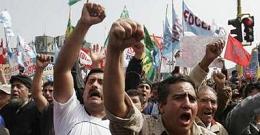Peru
National day of protest and agricultural strike
13/07/2008

At press time for this edition, the national day of protest of the
union center CGTP was taking place, together with a 48-hour
agricultural strike called by the rural small producers that was
spreading to several regions of the country.
According to the first reports, the protest had completely paralyzed
Ayacucho, Iquitos, Madre de Dios and Ucayali, among other zones,
making itself felt with particular force in the entire south and
center of the country, including blockades of big roads, as in Ica,
Arequipa, Puno and Cusco. During the day, small rural producers and
miners set the headquarters of the regional government of the town
Madre de Dios on fire, in protest against the so-called "Law of the
Jungle" with which the administration of Alan García is trying to
give lands in the zone to private interests. What is more, the
rallies called for the date, with a mass meeting prepared in Lima,
were numerous.
And this was in spite of the vast operation of intimidation and
repression by the government, that had declared the strike illegal
and deployed more than 100,000 policemen and even army troops that
occupied public buildings, airports, etc., in addition to breaking
up blockades and making about 200 arrests. The actions of July 8 and
9 are in addition to a long series of mobilizations by sectors and
regions that included miners’ strikes and uprisings like the one
that recently took place in the port city of Moquegua.
Alan García’s (APRA) government has been imposing a pro-imperialist,
anti-worker and anti-popular program, that, beginning with the
signing of the Free Trade Agreement with the US, has included new
attacks against wages, working conditions, which are already
enormously uncertain for the majority of workers, and against the
living standards of the rural small producers and popular sectors.
For example, the plans for eradicating the coca leaf and others
dictated by the government’s agreements with imperialism, to which
is added the increase in the cost of living owing to inflation in
the prices of foods and other goods.
To win against the tenacious resistance of workers and the people,
the government is leaning on agreements with the worst of the neo-
liberal right-wing and supporters of Fujimori, and it has been
carrying out a repressive offensive that includes "criminalizing
protest," supported by the cynical rhetoric of the "resurgence of
terrorism." At the same time, the mining and industrial employers
are hardening up against the big processes of union reorganization
and struggle for better working conditions that have arisen.
The masses’ actions these days show the willingness of the Peruvian
workers’, campesinos’ and people’s movement to struggle and the
broad repudiation of the APRA government and its plans for
surrender. However, the CGTP and other bureaucratic leaderships fail
to give any perspective to the mobilization, nor do they coordinate
the struggles by different sectors. For instance, some days ago, the
miners’ federation ended the strike in that sector, instead of
joining it to the national day of protest. In Cusco, there was a
commitment not to hinder the APEC meeting, that is, the meeting of
imperialism and its partners in the Pacific basin, at which Alan
García could play his cards.
The reformist strategy of exerting pressure on the government,
hoping that "growth will be for everyone," does not go beyond
isolated measures that, while they permit the base to express its
anger, are used by the bureaucracy for relaxing tensions. What is
needed is a real plan for a national strike, to unify the forces of
the workers, rural small producers and the poor population of the
regions, to defeat the government decisively and open the road to a
workers’, campesinos’ and people’s way out.
Translation by Yosef M.













